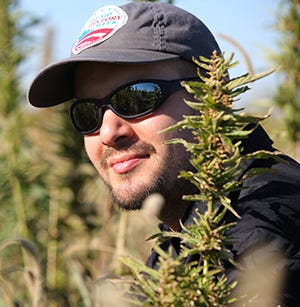Demeter USA's newest board member Errol Schweizer shares how biodynamic agriculture takes organic to the next step, and how retailers can help spread the message.

As former executive global grocery coordinator at Whole Foods Market, Errol Schweizer has been on the cutting edge of consumer and food production trends like fair trade, organic and non-GMO. Now he’s channeling his passion for mission-driven food production into promoting biodynamic agriculture as a board member for Demeter USA, the official certification organization for biodynamic products.
Here he shares how awareness around biodynamic, the parent philosophy and a deeper form of organic food production, is growing, and why it's a cause worth getting behind.
For someone who understands organic but isn’t as familiar with biodynamic, how would you explain it?
Errol Schweizer: Biodynamic is the predecessor and sort of a parent of organic farming—in fact, organic comes from the biodynamic concept of the farm as an organism, as a whole. It’s essentially one of the oldest certification techniques that protects the sustainability and resilience of the farm.
There are a few aspects that make it really timely. First off, there’s a huge focus on soil. Health soil is the foundation of biodynamic farming, and I think that’s primarily due to the focus on fertilizers and nutrient enhancement in the soil, especially from livestock, from nutrient catch crops as well as crop rotation. You can’t just spray all your pests away; you have to look at different ways to rotate through crops and confuse pests.
Speaking of bugs, weeds and pests are dealt with naturally, so it’s also about the timing of crops and developing the habitat for good bugs. That includes the bugs that will eat the critters that are going to eat your crops, but also pollinator habitats.
Livestock are also really important—not just in terms of generating fertilizer, but they’re a key component in biodynamic farming. Rotational grazing and holistic  management are very popular these days, and that is actually a core principal in biodynamic, and making sure that livestock are treated humanely so they can exhibit their natural behaviors.
management are very popular these days, and that is actually a core principal in biodynamic, and making sure that livestock are treated humanely so they can exhibit their natural behaviors.
The other thing that I think goes back to the pollinator discussion is that 10 percent of a Demeter-certified farm needs to be set aside for biodiversity. You can’t plant fence row to fence row—you have to leave part of the farm wild.
The key focus of biodynamic is that it contributes and increases the wellbeing of the farm, as well as each generation becomes healthier than the last.
Where is the demand growing? In brands or consumers?
ES: I would say it’s rooted in consumers. But I think the real reason for that is that biodynamic farming produces very high-quality raw materials and ingredients. And so if you try biodynamics ingredients or eat biodynamic foods, they’re usually among the best in their category. That’s something that I’ve consistently seen, whether it’s teas, tomatoes, wines or yogurt. The organoleptic qualities are a reflection of the sustainability and the resilience of the soil and the growing technique. So I think the biggest key is high-quality products, growing demand in the market,
growing understanding by consumers about what it means. Now it’s really about connecting the dots to have more organic farmers.
What can retailers do to help elevate this conversation?
ES: The first thing is shelf space—start selling biodynamic products. The second thing is helping educate consumers, whether it’s through social media, shelf-talkers, promotions, their own websites or partnering with brands. Then the third would be to price it reasonably. Don’t take extra margin above and beyond what you would normally do. These products are going to be produced at a slightly higher premium to organic, so be reasonable with the pricing. These are not going to be, out of the gate, your highest-selling or fastest-selling items. I think the important thing here is to get folks to try them.
In your mind, what’s been the most exciting advance or innovation or shift in thinking when it comes to food over the last few years?
ES: I started in a food co-op 20 years ago, and I was kind of fringe. And now it’s not only mainstream, but it’s still very cutting-edge—not just from the consumers or the retailers but investors. I think it’s great that it’s become so popular and populist. For us folks that have been around for a long time, I think it’s important that we continue to push the envelope and utilize that visibility to go deeper, because there are serious issues in our food system and we should be developing techniques that make each generation healthier, that make each crop-growing cycle more sustainable.
About the Author(s)
You May Also Like




